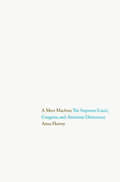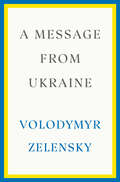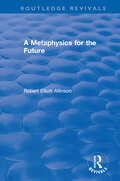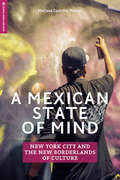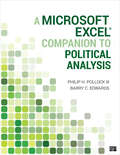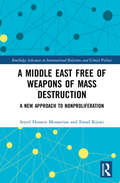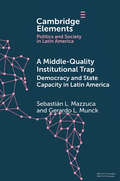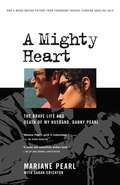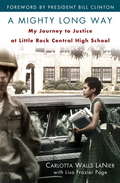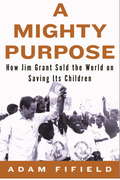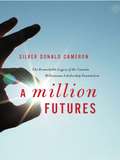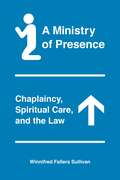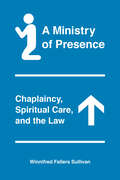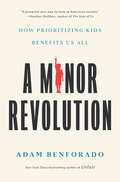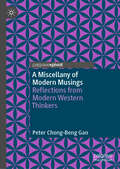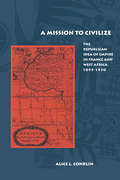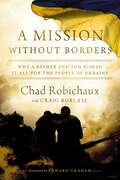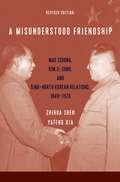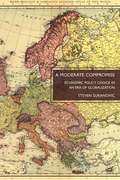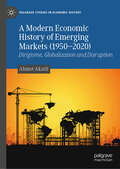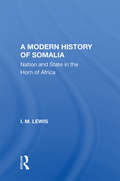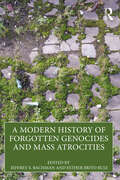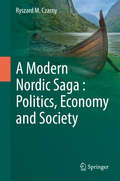- Table View
- List View
A Mere Machine
by Anna HarveyIntroductory textbooks on American government tell us that the Supreme Court is independent from the elected branches and that independent courts better protect rights than their more deferential counterparts. But are these facts or myths? In this groundbreaking new work, Anna Harvey reports evidence showing that the Supreme Court is in fact extraordinarily deferential to congressional preferences in its constitutional rulings. Analyzing cross-national evidence, Harvey also finds that the rights protections we enjoy in the United States appear to be largely due to the fact that we do not have an independent Supreme Court. In fact, we would likely have even greater protections for political and economic rights were we to prohibit our federal courts from exercising judicial review altogether. Harvey's findings suggest that constitutional designers would be wise to heed Thomas Jefferson's advice to "let mercy be the character of the law-giver, but let the judge be a mere machine.&rdquo
A Message from Ukraine: Speeches, 2019-2022
by Volodymyr ZelenskyAn urgent call to arms from the Ukrainian leader whose unwavering courage in the face of the Russian invasion has inspired the world and turned him overnight into a global beacon of democracy The words of a man. The message of a people. Bringing together a new introduction by Volodymyr Zelensky with his most powerful war speeches, this book recounts Ukraine&’s story through the words of its president. It is the story of a nation valiantly defending itself from Russian aggression. And it is the story of a people leading the world in the struggle for democracy. Above all, it is a battle cry for us all to stand up and fight for liberty. If not now, when? The only book officially authorized by President Zelensky, A Message from Ukraine includes speeches he has personally selected to tell the story of the Ukrainian people.
A Metaphysics for the Future (Routledge Revivals)
by Robert AllinsonThis title was first published in 2001. This work is intended to serve not only as an expression of a new idea of a philosophy, but as an "apologia" for philosophy as a legitimate and independent discipline in its own right. It argues that in the 20th century, truth has not been abandoned, but merely modified. The text proposes a return to truth and suggests that it is only after apprehending the truths of consciousness that the philosopher's mirror may become a kaleidoscope through which reality may be contemplated. First order truth lies in the realm of discovery, and discovery takes place only within the moment of subjective re-enactment.
A Method for Calculating Export Supply and Import Demand Elasticities
by Stephen TokarickA report from the International Monetary Fund.
A Mexican State of Mind: New York City and the New Borderlands of Culture (Global Media and Race)
by Melissa Castillo PlanasA Mexican State of Mind: New York City and the New Borderlands of Culture explores the cultural and creative lives of the largely young undocumented Mexican population in New York City since September 11, 2001. Inspired by a dialogue between the landmark works of Paul Gilroy and Gloria Anzaldúa, it develops a new analytic framework, the Atlantic Borderlands, which bridges Mexican diasporic experiences in New York City and the black diaspora, not as a comparison but in recognition that colonialism, interracial and interethnic contact through trade, migration, and slavery are connected via capitalist economies and technological developments. This book is based on ten years of fieldwork in New York City, with members of a vibrant community of young Mexican migrants who coexist and interact with people from all over the world. It focuses on youth culture including hip hop, graffiti, muralism, labor activism, arts entrepreneurship and collective making.
A Microsoft Excel® Companion to Political Analysis
by Philip H. Pollock Barry Clayton EdwardsThe trusted series of workbooks by Philip H. Pollock III and Barry C. Edwards continues with A Microsoft Excel®Companion to Political Analysis. In this new guide, students dive headfirst into actual political data working with the ubiquitous Excel software. Students learn by doing with new guided examples, annotated screenshots, step-by-step instructions, and exercises that reflect current scholarly debates in varied subfields of political science, including American politics, comparative politics, law and courts, and international relations. Chapters cover all major topics in political data analysis, from descriptive statistics through logistic regression, all with worked examples and exercises in Excel. No matter their professional goals, students can gain a leg up for their future careers by developing a working knowledge of statistics using Excel. By encouraging students to build on their existing familiarity with the Excel program, instructors can flatten the statistics learning curve and take some of the intimidation out of the learning process. Gain lost time usually spent troubleshooting software to provide students with a smooth transition into political analysis.
A Microsoft Excel® Companion to Political Analysis
by Philip H. Pollock Barry Clayton EdwardsThe trusted series of workbooks by Philip H. Pollock III and Barry C. Edwards continues with A Microsoft Excel®Companion to Political Analysis. In this new guide, students dive headfirst into actual political data working with the ubiquitous Excel software. Students learn by doing with new guided examples, annotated screenshots, step-by-step instructions, and exercises that reflect current scholarly debates in varied subfields of political science, including American politics, comparative politics, law and courts, and international relations. Chapters cover all major topics in political data analysis, from descriptive statistics through logistic regression, all with worked examples and exercises in Excel. No matter their professional goals, students can gain a leg up for their future careers by developing a working knowledge of statistics using Excel. By encouraging students to build on their existing familiarity with the Excel program, instructors can flatten the statistics learning curve and take some of the intimidation out of the learning process. Gain lost time usually spent troubleshooting software to provide students with a smooth transition into political analysis.
A Middle East Free of Weapons of Mass Destruction: A New Approach to Nonproliferation (Routledge Advances in International Relations and Global Politics)
by Seyed Hossein Mousavian Emad KiyaeiThe establishment of a Middle East zone free of nuclear weapons, a concept more recently broadened to cover all weapons of mass destruction (WMD), has been before the international community for decades. In this book, two experts from the region explore why the matter remains unresolved, and outline a comprehensive yet achievable roadmap to a Middle East free of WMD. Weapons of mass destruction pose an existential threat to global peace and security. But nowhere is it more urgent to stem their spread than in the Middle East, a region fraught with mistrust and instability. Accounting for these geopolitical realities, including the ongoing talks to curb Iran’s nuclear program, the authors present a practical and innovative strategy to a Middle East free of weapons of mass destructions (WMD). They outline a phased approach toward disarmament in the region, prescribing confidence-building measures and verification tools to create trust among the region’s governments. Their vision also sees the realization of a WMD-free zone within a broader regional agenda for security and cooperation to advance socioeconomic and political progress. This book will be of great interest to students and scholars of international relations, politics and security studies in the Middle East.
A Middle-Quality Institutional Trap: Democracy and State Capacity in Latin America (Elements in Politics and Society in Latin America)
by Gerardo L. Munck Sebastián L. MazzucaLatin America is currently caught in a middle-quality institutional trap, combining flawed democracies and low-to-medium capacity States. Yet, contrary to conventional wisdom, the sequence of development - Latin America has democratized before building capable States - does not explain the region's quandary. States can make democracy, but so too can democracy make States. Thus, the starting point of political developments is less important than whether the State-democracy relationship is a virtuous cycle, triggering causal mechanisms that reinforce each other. However, the State-democracy interaction generates a virtuous cycle only under certain macroconditions. In Latin America, the State-democracy interaction has not generated a virtuous cycle: problems regarding the State prevent full democratization and problems of democracy prevent the development of state capacity. Moreover, multiple macroconditions provide a foundation for this distinctive pattern of State-democracy interaction. The suboptimal political equilibrium in contemporary Latin America is a robust one.
A Mighty Heart: The Brave Life and Death of My Husband, Danny Pearl
by Sarah Crichton Mariane PearlFor five weeks the world waited for news about Danny Pearl, the Wall Street Journal reporter who was kidnapped in Karachi, Pakistan... And then came the broadcast of his shocking murder. The complete account of his abduction, the intense effort to rescue him, and the aftermath are told here-- in astonishing detail, and with courage and insight-- by his surviving wife, Mariane. A Mighty Heart is the unforgettable story of two journalists who fell in love with their work-- and with each other. Together, Mariane and Danny Pearl traveled across the globe, dedicated to journalism that increases the understanding of international politics and of ethnic and religious conflict. In the end, Danny was caught in the dangerous fissure where warring cultures, politics, and ideologies collide. A Mighty Heart is both a portrait of a partnership built on the ideals of love, truth, and justice and a critical look at the methods and structure of the Al Qaeda network.
A Mighty Long Way: My Journey to Justice at Little Rock Central High School
by Carlotta Walls Lanier Lisa Frazier PageWhen fourteen-year-old Carlotta Walls walked up the stairs of Little Rock Central High School on September 25, 1957, she and eight other black students only wanted to make it to class. But the journey of the Little Rock Nine,o as they came to be known, would lead the nation on an even longer and much more turbulent path, one that would challenge prevailing attitudes, break down barriers, and forever change the landscape of America. Descended from a line of proud black landowners and businessmen, Carlotta was raised to believe that education was the key to success. She embraced learning and excelled in her studies at the black schools she attended throughout the 1950s. With Brown v. Board of Education erasing the color divide in classrooms across the country, the teenager volunteered to be among the first black studentsuof whom she was the youngestuto integrate nearby Central High School, considered one of the nation's best academic institutions. But for Carlotta and her eight comrades, simply getting through the door was the first of many trials. Angry mobs of white students and their parents hurled taunts, insults, and threats. Arkansas's governor used the National Guard to bar the black students from entering the school. Finally, President Dwight D. Eisenhower was forced to send in the 101st Airborne to establish order and escort the Nine into the building. That was just the start of a heartbreaking three-year journey for Carlotta, who would see her home bombed, a crime for which her own father was a suspect and for which a friend of Carlotta's was ultimately jailedualbeit wrongly, in Carlotta's eyes. But she persevered to the victorious end: her graduation from Central. Breaking her silence at last and sharing her story for the first time, Carlotta Walls has written an inspiring, thoroughly engrossing memoir that is not only a testament to the power of one to make a difference but also of the sacrifices made by families and communities that found themselves a part of history. Complete with compelling photographs of the time, A Mighty Long Way shines a light on this watershed moment in civil rights history and shows that determination, fortitude, and the ability to change the world are not exclusive to a few special people but are inherent within us all.
A Mighty Purpose
by Adam FifieldThe inspiring story of how the iconoclastic humanitarian Jim Grant succeeded in saving the lives of tens of millions of children through his extraordinary ability to win over world leaders Nicholas Kristof hailed Jim Grant as a man who "probably saved more lives than were destroyed by Hitler, Mao, and Stalin combined." Nominated by President Jimmy Carter to head UNICEF, Grant ran the United Nations agency from 1980 to 1995 and became the most powerful advocate for children the world has ever seen. To ensure that even children trapped by war received health care and immunizations, he brokered humanitarian ceasefires by exploiting the political self-interests of presidents and warlords alike. Grant at first met fierce resistance at the United Nations and in his own organization, and some thought his ideas were crazy and dangerous. But as he kept toppling obstacle after obstacle, he eventually won over even his most stubborn detractors. Grant spearheaded a historic surge in worldwide childhood immunization rates and launched a movement that profoundly altered the face of global health and international development.
A Million Futures
by Silver Donald CameronIn 1998, hoping to leave a legacy for the new millennium, the federal government created the Canada Millennium Scholarship Foundation, which has since funded and empowered more than a million young Canadians. The Foundation itself has been a remarkable success story, a model of efficiency and political manoeuvring. The essential feature of the program was its innovative partnering with the provinces, recognizing different approaches to the issue - a stellar example of asymmetrical federalism.A brilliant, funny and highly entertaining storyteller, Silver Donald Cameron tells the inside story of the Foundation's life, which serves as a case study in astute management practice in the face of serious challenges. Woven into the narrative are the stories of individuals whose lives were affected by the Foundation's programs. Inspiring, funny, heart-breaking and surprising, these tales form the heart of the book. A Million Futures is the definitive testament to a unique, ground-breaking and transformative institution, abounding with useful lessons for organizations of all kinds, and anyone interested in innovative public policy.
A Ministry of Presence: Chaplaincy, Spiritual Care, and the Law
by Winnifred Fallers SullivanMost people in the United States today no longer live their lives under the guidance of local institutionalized religious leadership, such as rabbis, ministers, and priests; rather, liberals and conservatives alike have taken charge of their own religious or spiritual practices. This shift, along with other social and cultural changes, has opened up a perhaps surprising space for chaplains--spiritual professionals who usually work with the endorsement of a religious community but do that work away from its immediate hierarchy, ministering in a secular institution, such as a prison, the military, or an airport, to an ever-changing group of clients of widely varying faiths and beliefs. In A Ministry of Presence, Winnifred Fallers Sullivan explores how chaplaincy works in the United States--and in particular how it sits uneasily at the intersection of law and religion, spiritual care, and government regulation. Responsible for ministering to the wandering souls of the globalized economy, the chaplain works with a clientele often unmarked by a specific religious identity, and does so on behalf of a secular institution, like a hospital. Sullivan's examination of the sometimes heroic but often deeply ambiguous work yields fascinating insights into contemporary spiritual life, the politics of religious freedom, and the never-ending negotiation of religion's place in American institutional life.
A Ministry of Presence: Chaplaincy, Spiritual Care, and the Law
by Winnifred Fallers SullivanMost people in the United States today no longer live their lives under the guidance of local institutionalized religious leadership, such as rabbis, ministers, and priests; rather, liberals and conservatives alike have taken charge of their own religious or spiritual practices. This shift, along with other social and cultural changes, has opened up a perhaps surprising space for chaplains—spiritual professionals who usually work with the endorsement of a religious community but do that work away from its immediate hierarchy, ministering in a secular institution, such as a prison, the military, or an airport, to an ever-changing group of clients of widely varying faiths and beliefs. In A Ministry of Presence, Winnifred Fallers Sullivan explores how chaplaincy works in the United States—and in particular how it sits uneasily at the intersection of law and religion, spiritual care, and government regulation. Responsible for ministering to the wandering souls of the globalized economy, the chaplain works with a clientele often unmarked by a specific religious identity, and does so on behalf of a secular institution, like a hospital. Sullivan's examination of the sometimes heroic but often deeply ambiguous work yields fascinating insights into contemporary spiritual life, the politics of religious freedom, and the never-ending negotiation of religion's place in American institutional life.
A Minor Revolution: How Prioritizing Kids Benefits Us All
by Adam BenforadoA revelatory investigation into how America is failing its children, and an urgent manifesto on why helping them is the best way to improve all of our lives—from the New York Times bestselling author of Unfair: The New Science of Criminal Injustice&“Revolutionary and accessible . . . a powerful new way to look at American society through the lens of our children.&”—Heather McGhee, New York Times bestselling author of The Sum of UsAt the dawn of the twentieth century, a bright new age for children appeared on the horizon, with progress on ending child labor, providing public education, combating indigence, promoting wellness, and creating a juvenile justice system. But a hundred years on, the promised light has not arrived. Today, more than eleven million American children live in poverty and more than four million lack health insurance. Each year, we prosecute thousands of kids as adults, while our schools crumble. We deny young people any political power, while we fail to act on the issues that matter most to them: racism, inequality, and climate change.Through unforgettable stories, law professor Adam Benforado draws a vivid portrait of our neglect. We are there when Ariel is placed in an orphanage after her parents are locked away for transporting marijuana, when Harold first gazes in disbelief upon the immaculate lawn of an elite private school after a childhood of asphalt play yards, when Wylie is hit with a paddle by his public-school principal as punishment for taking a moment of silence to protest gun violence. When Tyler runs for governor at age seventeen, we are also there to witness the extraordinary capacities of young people.Our disregard for children&’s rights is not simply a moral problem; it&’s also an economic and social one. The root cause of nearly every major challenge we face—from crime to poor health to unemployment—can be found in our mistreatment of kids. But in that sobering truth is also the key to changing our fate as a nation.Drawing on the latest research on the value of early intervention, investment, and empowerment, A Minor Revolution makes the urgent case for putting children first—in our budgets and policies, in how we develop products and enact laws, and in our families and communities. Childhood is the window of opportunity for all of us.
A Miscellany of Modern Musings: Reflections from Modern Western Thinkers
by Peter Chong-Beng GanThe book starts off by giving a quick overview of the main phases within the history of philosophy in the Western tradition. It then homes in on the “modern” phase and proceeds to select key thinkers that represent that slice from the rich intellectual heritage of the West. The main chapters have these thinkers’ names as heading. The work is meant to be expository and discursive, suited to introduce the neophyte in philosophy to some of the big questions asked by philosophers and their methods of addressing these questions as well as their unique proposed answers. The coverage is selective rather than extensive; and hence, only a small portion of the philosopher’s corpus of writings will be hand-picked and considered.
A Mission To Civilize
by Alice L. Conklin<P>This book addresses a central but often ignored question in the history of modern France and modern colonialism: How did the Third Republic, highly regarded for its professed democratic values, allow itself to be seduced by the insidious and persistent appeal of a “civilizing” ideology with distinct racist overtones? <P>By focusing on a particular group of colonial officials in a specific setting—the governors general of French West Africa from 1895 to 1930—the author argues that the ideal of a special civilizing mission had a decisive impact on colonial policymaking and on the evolution of modern French republicanism generally.
A Mission Without Borders: Why a Father and Son Risked it All for the People of Ukraine
by Chad RobichauxAuthor, speaker, and former Force Recon Marine Chad Robichaux offers an honest, no-holds-barred account of what has really been happening in Ukraine and shares powerful stories that are soaked in resiliency and determination, faith and sacrifice in the face of overwhelming opposition.When Russian forces invaded Ukraine on February 24, 2022, former Force Recon Marine Chad Robichaux knew that innocent people were about to be exposed to untold brutality. He also knew that God was inviting him to get involved. With little idea of the trials that would follow, Chad's response was simple and clear: "yes." As he gathered a team of elite special operations veterans, he invited his twenty-five-year-old son, Hunter--also a Marine combat veteran--to partner with him in Ukraine. Over the course of seven trips, Chad saw a change in Hunter as his confidence grew and he exceled among the team. Chad's own faith also grew as he learned to relinquish control and trust God with his son and what he witnessed in the brutality of war.A Mission Without Borders is a powerful account of the lessons we can learn whenever we say yes to God. Chad's experience will help readersunderstand what the conflict in Ukraine was like for everyday citizens beyond the political fog;discover how a bond can grow between a father and son as they face hardship together; andrealize that God doesn't just call us to go to the aid of the people we know and love, sometimes he calls us to help strangers--because it's the right thing to do. A Mission Without Borders will take readers deep into the war in Ukraine. From Russia's use of ballistic and chemical weapons on civilians, to the inspirational story of the role that the Ukrainian church has played in the war, Chad's story of courage and hope needs to be heard. It is rich in human and spiritual truth and will connect deeply with readers of all walks.
A Misunderstood Friendship: Mao Zedong, Kim Il-sung, and Sino-North Korean Relations, 1949-1976: Revised Edition
by Zhihua Shen Yafeng XiaToday, the People’s Republic of China is North Korea’s only ally on the world stage, a tightly knit relationship that goes back decades. Both countries portray their partnership as one of “brotherly affection” based on shared political ideals—an alliance “as tight as lips to teeth”—even though relations have deteriorated in recent years due to China’s ascendance and North Korea’s intransigence.In A Misunderstood Friendship, leading diplomatic historians Zhihua Shen and Yafeng Xia draw on previously untapped primary source materials revealing tensions and rivalries to offer a unique account of the China–North Korea relationship. They unravel the twists and turns in high-level diplomacy between China and North Korea from the late 1940s to the death of Mao Zedong in 1976. Through unprecedented access to Chinese government documents, Soviet and Eastern European archives, and in-depth interviews with former Chinese diplomats and North Korean defectors, Shen and Xia reveal that the tensions that currently plague the alliance between the two countries have been present from the very beginning of the relationship. They significantly revise existing narratives of the Korean War, China’s postwar aid to North Korea, Kim Il-sung’s ideological and strategic thinking, North Korea’s relations with the Soviet Union, and the importance of the Sino-U.S. rapprochement, among other issues. A Misunderstood Friendship adds new depth to our understanding of one of the most secretive and significant relationships of the Cold War, with increasing relevance to international affairs today.
A Moderate Compromise
by Steven SuranovicLooking at all sides of the globalization debate, this book analyzes how international economic policy is made and how it has become so controversial. The author offers a solution to the debate between free trade/unregulated markets and the push for greater government involvement that is consistent with both economic efficiency and social justice
A Modern Economic History of Emerging Markets: Dirigisme, Globalization and Disruption (Palgrave Studies in Economic History)
by Ahmet AkarliThis book offers a comprehensive economic history of emerging market economies post-WWII and identifies a complex web of sustainability problems that face the EMEs going forward. It seeks to present a truly global perspective on the development of EMEs and the long-term trends that have brought EMEs to a critical economic juncture. The first section of the book charts how EMEs became tightly integrated into the global economy at rapid pace, analysing economic achievements as well as imbalances and sustainability issues that have been generated over time. It considers how EMEs have withstood episodes of complex structural transitions and financial shocks, and offers comparative perspectives on patterns of dispersion within the EME landscape from the end of WWII to the present. The second part of the book seeks to understand how EMEs might cope with the volatility brought about by a new ‘age of disruption’ defined by major structural challenges to the neo-liberal economic order. It considers which EMEs are best positioned to respond to issues of economic inequality, financial excess, technological disruption and climate change, what a global historical understanding of the EMEs can offer to policymakers, and the impact on the EME investment landscape. This book will be of interest to a broad audience including researchers of economic history and political economy, as well as policymakers, investment professionals, and the general reader interested in global economic development.
A Modern History Of Somalia: Nation And State In The Horn Of Africa, Revised, Updated, And Expanded Edition
by I.M. LewisThis latest edition of A Modern History of the Somali brings I. M. Lewis's definitive history up to date and shows the amazing continuity of Somali forms of social organization. Lewis's history portrays the ingeniousness with which the Somali way of life has been adapted to all forms of modernity. "By far the most penetrating of the works on Somal
A Modern History of Forgotten Genocides and Mass Atrocities
by Jeffrey S. Bachman Esther Brito RuizThis is the first textbook of its kind to amass cases of genocide and other mass atrocities across the nineteenth, twentieth, and twenty-first centuries that have largely been pushed to the periphery of Genocide Studies or “forgotten” altogether.Divided into four thematic sections – Genocide and Imperialism; War and Genocide; State Repression, Military Dictatorships, and Genocide; and Human-Caused Famine, Attrition, and Genocide – A Modern History of Forgotten Genocides and Mass Atrocities covers five continents, including case studies from Biafra, Yemen, Argentina, Russia, China, and Bengal. They range from the French conquest of Algeria in the mid-nineteenth century to the Yazidi genocide perpetrated by the Islamic State in Iraq and Syria between 2014 and 2017, and show that at times of rising authoritarianism, military conquest, and weaponization of hunger, lines between what is war and what is genocide are increasingly blurred. By including genocides and mass atrocities that are often overlooked, this volume is crucial to the ongoing debates about whether “this atrocity or that one” amounts to genocide.By including key points, events, terms, and critical questions throughout, this is the ideal textbook for undergraduate students who study genocide, mass atrocities, and human rights across the globe.
A Modern Nordic Saga: Politics, Economy And Society
by Ryszard M. CzarnyThis book focuses on the Nordic countries through a European perspective and wishes to draw attention to their place in the new world order. The volume emphasizes the specificity of their cooperation within the region itself as well as within the European Union, and stresses the importance of the Nordic region as an area of possibilities and tangible chances resulting from the challenges of globalization. The social, cultural, political and economic dimensions of these countries are characterized by cooperation among states, their collaboration with other regional organizations and within international projects, as well as exchange of viewpoints on the specificity of the current Norden issues. The cooperation of the Nordic countries and their inhabitants as well as migrations between the Scandinavian states have been a trademark of the common and shared history of Norden.
